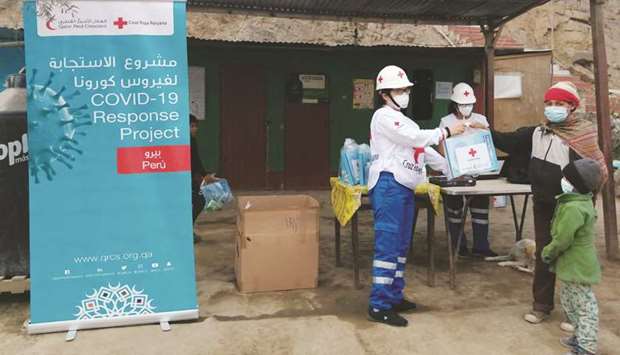Qatar Red Crescent Society (QRCS) is working on a project to support the Peruvian government’s epidemiological control strategy to prevent the spread of Covid-19 through community transmission. The project is aimed at enhancing the preventive control of Covid-19 in transit areas and disseminating reliable information for coronavirus prevention in urban areas, QRCS has said in a statement.
A total of 3,000 people will benefit from the project in three vulnerable communities of San Juan de Lurigancho district, Lima. Up to the date of this report, the tasks accomplished include the purchase of control/protection equipment, supplies for hygiene and protection kits, and backpack sprayers for disinfection, the statement notes.
Together with the provincial branch of the Peruvian Red Cross in Lima, the volunteers assembled the protection and cleaning kits to be distributed in the vulnerable communities affected by Covid-19. The distribution activities began in the three target communities.
So far, hygiene and disinfection kits have been delivered to 174 families (522 people) as follows: Asentamiento Humano Residencial El Paraíso (38 families), Asociacion Centro Poblado las Casuarinas de Jicamarca (86 families) and Asociacion de Vivienda Residencial El Paraíso (50 families).
The distributions were made in compliance with the social distancing measures imposed by the government. At the same time, key messages were disseminated during the distributions to reinforce prevention and care behaviours against Covid-19. This project is part of QRCS’s initiative to back the fellow national societies in 22 countries across six continents, aimed at protecting 320,000 people against the virus, with a total budget of QR2,236,827.
These countries are Palestine, Afghanistan, Pakistan, Nepal, Tajikistan, Mongolia, Laos, Vanuatu, Ethiopia, Chad, Senegal, Mauritania, Ivory Coast, Mali, Sierra Leone, Albania, Kosovo, Montenegro, Venezuela, El Salvador, Peru and Panama.
The list of activities conducted by QRCS in support of those countries includes the provision of equipment and supplies for health facilities, provision of medicines and medical supplies, protection for medical professionals and volunteers, provision of food and shelter for families worst affected by loss of income, and provision of protective supplies (masks, gloves and sanitisers, among others).
Together with the provincial branch of the Peruvian Red Cross in Lima, the volunteers assembled the protection and cleaning kits to be distributed in the vulnerable communities affected by Covid-19. The distribution activities began in the three target communities.
So far, hygiene and disinfection kits have been delivered to 174 families (522 people) as follows: Asentamiento Humano Residencial El Paraíso (38 families), Asociacion Centro Poblado las Casuarinas de Jicamarca (86 families) and Asociacion de Vivienda Residencial El Paraíso (50 families).
The distributions were made in compliance with the social distancing measures imposed by the government. At the same time, key messages were disseminated during the distributions to reinforce prevention and care behaviours against Covid-19. This project is part of QRCS’s initiative to back the fellow national societies in 22 countries across six continents, aimed at protecting 320,000 people against the virus, with a total budget of QR2,236,827.
These countries are Palestine, Afghanistan, Pakistan, Nepal, Tajikistan, Mongolia, Laos, Vanuatu, Ethiopia, Chad, Senegal, Mauritania, Ivory Coast, Mali, Sierra Leone, Albania, Kosovo, Montenegro, Venezuela, El Salvador, Peru and Panama.
The list of activities conducted by QRCS in support of those countries includes the provision of equipment and supplies for health facilities, provision of medicines and medical supplies, protection for medical professionals and volunteers, provision of food and shelter for families worst affected by loss of income, and provision of protective supplies (masks, gloves and sanitisers, among others).

